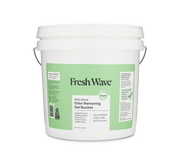Solution to a Smelly Laundry Room
- Ventilate Laundry Room With Fan
- Tidy Up Any Miscellaneous Items in the Laundry Room
- Use Fresh Wave’s Laundry Booster
Whether it’s an overflowing laundry hamper filled with dirty clothes from a teenager’s room, your child’s hockey bag smelling after a hard practice at the rink, or even just a pile of dirty clothes sitting on top of the washing machine, there’s bound to be certain aromas in your washroom from unwashed laundry.
But what happens when that smell is far too unbearable and has a rather pungent sulfur smell to it? How did that stench make its way to the laundry room through appliances, clothing, or naturally developed spores? More importantly, can the odor be eliminated easily and naturally?
The Different Scents in the Laundry Room
There seem to be two extremes when it comes to possible laundry room smells: a lovely odor of fresh ocean breeze or a field of lavender or the complete opposite scent of dirty socks worn by teenagers that have been trapped with sweat and old shoe dust. We would all prefer the former to keep our homes smelling fresh and common household odors at bay.
However, neither of those smells are anything near quite as bad as a laundry room that smells like rotten eggs. And if you do have a laundry room odor that is consistent to that of a rotten egg, it’s more than likely not your clothing or having anything to do with general bathing or cleaning practices.
In fact, the probability is extremely high that the main culprit for a laundry room that smells of rotten eggs is either mold or mildew.
Why is There a Bad Smell in My Laundry Room?
Mold and mildew thrive in environments that have lots of moisture. So although it can be difficult to do so in a laundry room, controlling moisture is the main way to limit mold or mildew growth.
Combining vegetative filament thread mycelium and germinating fungi structures, mold, being a living organism and naturally occurring fungus, forms best between 70 and 85 degrees Fahrenheit and in humid surroundings. That doesn’t mean that mold growths can’t reproduce in other conditions. Fungi is able to generate in most areas that are consistently above 40 degree Fahrenheit, and on most types of surfaces including wood, carpet, drywall, and in between tiles.
Because mold is able to materialize really anywhere in a house, especially in rooms where water and humidity are prevalent, such as a kitchen, bathroom, or laundry room, there will likely be a pungent odor wherever it is found.
As mildew is a type of mold, it will smell eerily similar to, if not the same as, mold. If the rotten egg smell in your laundry room is indeed coming from mold or mildew, this is due to the fungus releasing hydrogen sulfide gas (H2S). Because H2S is an irritant to humans, it can cause mild to moderate discomfort with some side effects like sneezing, headaches, dizziness, or coughing.
Since mold and mildew are unwanted in a house, it can be even more irritating to find the growth in a laundry room, a place where one expects items in the room to be clean and fresh smelling (that is, after running the washing machine and dryer).
If you do have either mold or mildew growing, and frankly invading, in your laundry room, there are many ways to remove the growth and to remove the odor associated with the mold and mildew stink which is commonly identified as having a sulfur-like odor, or more usually spoken about as a rotten egg smell.
Note that if your laundry room smells like rotten eggs and yet the area is as clean as can be with no mold or mildew found, there might be an issue with the sewage line which would require a trained plumbing, heating, and sewer technician to attend to the issue.
Solutions to a Smelly Laundry Room
While it’s common knowledge that mold and mildew should be removed as soon as possible, there are steps to mitigate the stench emanating from the fungi into the rest of the laundry room before the growths are even removed altogether.
One option, which many might have tried already, is to ventilate the laundry room with a fan. Air circulation is important in any room that traps in heat and humidity, but especially one that so frequently comes into contact with household items like clothing and sheets that harbor dirt and bacteria from environments outside of the home.
Another option is to tidy up any miscellaneous items in the laundry room that could be sitting in the stink or a wet spot on the counter. Towels are notorious for harboring that mildewy smell, so remove clean towels from the laundry room and dryer first to keep them from gradually soaking up humidity and moisture.
You can also supplement your favorite detergent with a detergent specifically formulated to eliminate odor. Fresh Wave’s Odor Removing Laundry Booster is water based and laced with plant essential oils to lift unpleasant smells out of clothing and the washing machine. Simply add 2-3 capfuls to your machine during the wash or rinse cycle and let the proprietary Fresh Wave formula soak through clothing fibers that may harbor foul odor after sitting in a smelly laundry room.
Fresh Wave is made with natural ingredients and no harmful toxins or artificial scents. Ingredients include plant oils from pine, cedarwood, anise, and lime so you can introduce more of those good scents and less of bad back into your laundry room. Whether you spray, wipe, or absorb away bad smells in your laundry room, use Fresh Wave to keep odors at bay. And remember to clean that mold or mildew, too!



